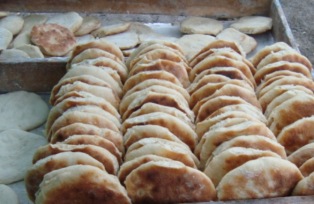Small demonstrations erupt in Sudan’s Gezira state over bread prices
September 21, 2013 (KHARTOUM) – Dozens of Sudanese have demonstrated in Gezira state’s capital city of Wad Madani on Saturday against increases in bread price.
 They used to buy four loaves of bread at a price of one pound, but that was reduced to three loaves only.
They used to buy four loaves of bread at a price of one pound, but that was reduced to three loaves only.
Angry residents of Al-Ishair, Al-Dibagha, and Al-Quoba neighborhoods have closed a major road in the city setting fire on old car tires till late night prompting riot police to fire teargas to disperse the protestors.
A member of the bakeries union in Wad Madani locality who preferred to stay anonymous stressed that prices of the bread production inputs including wheat flour, oil, and yeast did not increase, denying reduction of bread weight.
Sudan’s finance ministry officially announced its intention to lift fuel subsidies in the coming days after receiving clearance from the government saying it will be implemented in conjunction with an increase in the minimum wage.
Last week, the head of Sudan’s workers union, Ibrahim Ghandour, said that the decision to remove subsidies is confined to fuel prices, asserting that the finance ministry agreed to continue subsidizing wheat and electricity.
But economists agree that lifting fuel subsidies would lead to a general price increase particularly in the prices of basic goods.
Sudan currently imports more than 2 million tonnes of wheat annually at a cost of $900 million.
The Sudanese economy was hit hard since the southern part of the country declared independence in July 2011, taking with it about 75% of the country’s oil output.
Prior to the country’s breakup, Sudan produced close to 500,000 barrels but now its output is limited to 140,000 barrels per day. Oil revenue constituted more than half of the Sudan’s revenue and 90% of its exports.
Khartoum was forced to introduce a contractionary budget that saw the partial lifting of fuel and food subsidies which triggered rare but small demonstrations across the country.
The government defended the measures saying that the country can no longer afford to pay for these subsidies.
(ST)
